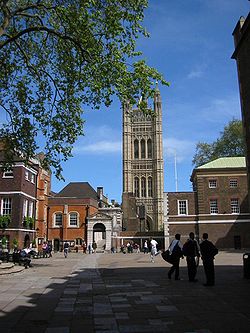Public school
- Public school
-
Public school (Royaume-Uni)
En Angleterre et au Pays de Galles, le terme Public School désigne une école privée dont le recrutement n’est pas limité par des restrictions géographiques ni religieuses, mais par des frais généralement très élevés. En général, le terme renvoie à des écoles très anciennes et prestigieuses et non des établissements privés récents. Récemment, ce terme a évolué pour désigner plus spécifiquement des écoles privées pour des élèves âgés de 13 à 18 ans.
Les neuf public schools de 1868

Westminster School, Londres : l'entrée principale
Le Public Schools Act de 1868 répertorie les neuf public schools les plus célèbres d'Angleterre. Toutes avaient en principe vocation d'accueillir les enfants des familles pauvres. En voici la liste :
- Westminster School, située près de l'abbaye de Westminster, au centre de Londres. Elle a eu pour élèves Ben Jonson, George Herbert, John Dryden, John Locke, Christopher Wren, Henry Purcell, Edward Gibbon, Jeremy Bentham, John Gielgud, Andrew Huxley, Peter Ustinov, Helena Bonham Carter, Dido.
- Winchester College, fondé par charte royale de Richard II d'Angleterre en 1382. Parmi ses élèves, on citera Matthew Arnold, Alfred Douglas, G. H. Hardy, Oswald Mosley, Anthony Trollope.
- Eton College, fondé en 1440 par Henri VI d'Angleterre. Il eut pour élèves Arthur Balfour, Jeremy Brett, Henry Fielding, Ian Fleming, William Ewart Gladstone, Aldous Huxley, John Maynard Keynes, George Orwell, William de Galles.
- Saint Paul's School, fondée en 1509 par John Colet, doyen de Saint-Paul, sur un terrain au nord de la cathédrale. Parmi ses anciens élèves on trouve John Milton, Samuel Pepys, Gilbert Keith Chesterton.
- Shrewsbury School, fondée en 1552. Charles Burney y fut élève, ainsi que Charles Darwin, Samuel Butler, Nevil Shute, Martin Rees et Michael Palin.
- Merchant Taylors' School, fondée in 1561 par des membres de l'honorable compagnie des marchands tailleurs. Située à l'origine dans la City, elle est installée aujourd'hui à Northwood, dans la banlieue nord de Londres.
- Rugby School, fondée en 1567 par Lawrence Sheriff, un commerçant de la ville. Elle est à l'origine du rugby. Parmi ses élèves, l'établissement compte Lewis Carroll, Austen Chamberlain, Neville Chamberlain, Wyndham Lewis et Salman Rushdie.
- Harrow School, fondée en 1572 par charte royale de la reine Élisabeth Ire d'Angleterre accordée à John Lyon. Parmi ses élèves, on citera Lord Byron, Winston Churchill, Jawaharlal Nehru, Stanley Baldwin, Joseph Banks, Cecil Beaton.
- Charterhouse School, à Godalming dans le Surrey. Fondée en 1611 à Londres par Thomas Sutton sur l'emplacement d'une ancienne chartreuse, elle compte parmi ses anciens élèves Joseph Addison, Richard Steele, William Makepeace Thackeray, Robert Baden-Powell, Max Beerbohm et Peter Gabriel.
Voir aussi
 Portail des écoles
Portail des écoles Portail du Royaume-Uni
Portail du Royaume-Uni
Catégorie : Éducation au Royaume-Uni
Wikimedia Foundation.
2010.
Contenu soumis à la licence CC-BY-SA. Source : Article Public school de Wikipédia en français (auteurs)
Regardez d'autres dictionnaires:
public school — public school, adj. 1. (in the U.S.) a school that is maintained at public expense for the education of the children of a community or district and that constitutes a part of a system of free public education commonly including primary and… … Universalium
public school — public schools 1) N VAR In Britain, a public school is a private school that provides secondary education which parents have to pay for. The pupils often live at the school during the school term. He was headmaster of a public school in the West… … English dictionary
Public School — [ pʌblɪk skuːl; englisch »öffentliche Schule«] die, / s, 1) in England traditionsreiche Privatschule der Sekundarstufe (13. 18. Lebensjahr) mit angeschlossenem Internationalem Public Schools besitzen meist ein größeres Vermögen und erhalten… … Universal-Lexikon
Public school — (a) In Great Britain, any of various schools maintained by the community, wholly or partly under public control, or maintained largely by endowment and not carried on chiefly for profit; specif., and commonly, any of various select and usually… … The Collaborative International Dictionary of English
public school — [pœblikskul; pyblikskul] n. f. ÉTYM. 1894, Lavisse et Rambaud; mot angl. (v. 1580), de public, et school « école ». ❖ ♦ En Grande Bretagne, École secondaire payante (souvent réservée aux classes supérieures) qui prépare à l Université. REM. L… … Encyclopédie Universelle
public school — ► NOUN 1) (in the UK) a private fee paying secondary school. 2) (chiefly in North America) a school supported by public funds … English terms dictionary
public school — n 1.) in Britain, a private school for children aged between 13 and 18, whose parents pay for their education. The children often live at the school while they are studying →↑state school 2.) a free local school, especially in the US and Scotland … Dictionary of contemporary English
public school — n. ☆ 1. in the U.S., an elementary or secondary school that is part of a system of free schools maintained by public taxes and supervised by local authorities 2. in much of Great Britain, any of a number of endowed, private boarding schools,… … English World dictionary
public school — noun count or uncount ** 1. ) AMERICAN a school that is controlled and paid for by the government 2. ) BRITISH an expensive private school where students usually live as well as study … Usage of the words and phrases in modern English
Public school — The term public school has two distinct (and virtually opposite) meanings depending on the location of usage: * in the United States, Australia and Canada: A school funded from tax revenue and most commonly administered to some degree by… … Wikipedia

